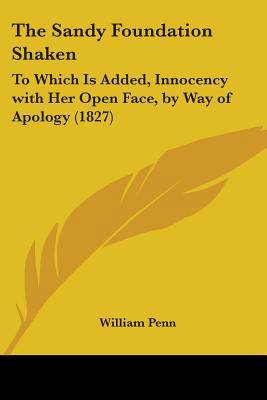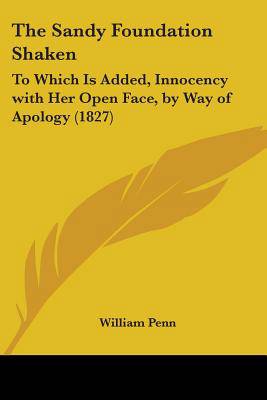
- Afhalen na 1 uur in een winkel met voorraad
- Gratis thuislevering in België vanaf € 30
- Ruim aanbod met 7 miljoen producten
- Afhalen na 1 uur in een winkel met voorraad
- Gratis thuislevering in België vanaf € 30
- Ruim aanbod met 7 miljoen producten
Zoeken
The Sandy Foundation Shaken
To Which Is Added, Innocency with Her Open Face, by Way of Apology (1827)
William Penn
Paperback | Engels
€ 27,45
+ 54 punten
Uitvoering
Omschrijving
The Sandy Foundation Shaken is a book written by William Penn in 1827. The book is a religious treatise that challenges the beliefs of the Church of England and advocates for a more liberal interpretation of Christianity. The title of the book is derived from a biblical passage that warns against building one's faith on a ""sandy foundation."" In the book, Penn argues that the Church of England has strayed from the true teachings of Christ and has become too focused on ritual and ceremony. He advocates for a simpler, more personal form of worship that emphasizes individual spiritual experience over institutional authority. In addition to The Sandy Foundation Shaken, the book also includes another work by Penn titled Innocency With Her Open Face, By Way Of Apology. This work is a defense of Quaker beliefs and practices, which were often misunderstood and persecuted in Penn's time. Penn argues that Quakerism is a legitimate form of Christianity that emphasizes the inner light of God within all people. Overall, The Sandy Foundation Shaken is a significant work in the history of religious dissent and the development of liberal Christianity. It reflects Penn's deep commitment to his faith and his belief in the importance of individual conscience in matters of religion.This scarce antiquarian book is a facsimile reprint of the old original and may contain some imperfections such as library marks and notations. Because we believe this work is culturally important, we have made it available as part of our commitment for protecting, preserving, and promoting the world's literature in affordable, high quality, modern editions, that are true to their original work.
Specificaties
Betrokkenen
- Auteur(s):
- Uitgeverij:
Inhoud
- Aantal bladzijden:
- 64
- Taal:
- Engels
Eigenschappen
- Productcode (EAN):
- 9781104505172
- Verschijningsdatum:
- 10/05/2009
- Uitvoering:
- Paperback
- Formaat:
- Trade paperback (VS)
- Afmetingen:
- 152 mm x 229 mm
- Gewicht:
- 99 g

Alleen bij Standaard Boekhandel
+ 54 punten op je klantenkaart van Standaard Boekhandel
Beoordelingen
We publiceren alleen reviews die voldoen aan de voorwaarden voor reviews. Bekijk onze voorwaarden voor reviews.








